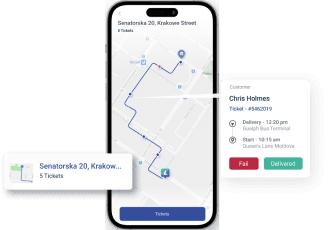TABLE OF CONTENTS

Sign-Up
Enter your email address
GPS Tracking Software Future Trends
It’s time to adopt advanced technology and leave behind paper maps and old navigation devices because the future of GPS tracking is revolutionizing rapidly. It is teeming with innovation, from augmented reality that overlays your world with helpful information to artificial intelligence that predicts traffic patterns. GPS is on a path to transform how we navigate and interact with the world around us.
GPS tracking technology is advancing rapidly. It is transforming how we navigate and manage assets worldwide. From augmented reality enhancing real-time data overlays to artificial intelligence optimizing predictive analytics. These innovations are reshaping industries across the board.
The integration of 5G technology promises faster and more reliable connectivity, while autonomous vehicles rely on GPS navigation for safe and efficient operations. Wearable devices and indoor positioning systems further expand tracking capabilities.
GPS tracking is also encouraging eco-friendly practices by optimizing routes and reducing emissions. So, Are you ready for a ride through the exciting world of next-generation GPS tracking?
Augmented Reality (AR) and GPS Tracking
Augmented Reality (AR) transforms GPS tracking by overlaying digital information onto the physical environment. This integration enhances user navigation and interaction by providing real-time, context-rich data directly within the user's field of view. AR makes navigation intuitive. It is reducing the reliance on maps and written instructions. Instead of searching for directions, you can see visual cues like arrows and symbols overlaid on the real world that guide you effortlessly to your destination.
This trend is essential as it improves navigation efficiency and user experience. You can easily locate points of interest by merging GPS location data with AR technology, such as restaurants, landmarks, and historical sites. For instance, tourists exploring a city can use AR-enhanced GPS to view historical facts about buildings as they walk down streets. That way, you can make your experience more engaging and informative.
Augmented Reality in GPS tracking isn't just about finding places but also it enhances safety and emergency response. Emergency services can use AR overlays to pinpoint the exact location of incidents. It displays real-time hazards and guides responders to the scene efficiently. This capability improves response times and situational awareness. It is very helpful in critical situations where every second counts.
Artificial Intelligence (AI) Integrating
Artificial Intelligence (AI) integration in GPS tracking enhances precision, reliability, and operational efficiency. AI analyzes vast amounts of data to make intelligent decisions. AI algorithms improve location tracking accuracy, overcoming challenges like signal interference in urban areas. AI enhances the reliability of GPS systems by continuously learning from data. That way it provides more precise location information.
This trend is essential as it enables predictive analytics for route optimization and real-time decision-making. For example, AI algorithms can predict traffic patterns based on historical GPS data. It helps logistics companies optimize delivery routes to reduce fuel consumption and improve delivery times. This predictive capability enhances operational efficiency and reduces costs.
AI-powered GPS tracking systems offer personalized recommendations and insights, based on user behavior and preferences. For instance, navigation apps can suggest alternate routes based on real-time traffic conditions, adapting to the user's preferences for the fastest or scenic routes. This personalized approach improves user experience and engagement with GPS applications.
Next-Generation Connectivity (5G)
Next-generation connectivity, specifically 5G technology is revolutionizing real-time GPS tracking by offering faster, more reliable, and low-latency connections. This advancement significantly enhances the speed and efficiency of transmitting location data. It is essential for applications requiring instant updates and accuracy.
The importance of 5G lies in its ability to reduce latency and the delay in data transmission between devices. GPS tracking devices can provide near real-time location updates with lower latency which is critical for applications like emergency response, where timely information can save lives.
In logistics, 5G enables fleet managers to monitor vehicles with minimal delay, optimizing routes in response to traffic updates received in real-time. This capability ensures efficient delivery schedules and enhances overall fleet management.
Furthermore, 5G's increased bandwidth supports the transmission of larger data volumes, such as high-definition video feeds from cameras on moving vehicles. This feature enhances situational awareness and allows for more detailed monitoring and analysis in fields like security and surveillance.
GPS Tracking for Autonomous Vehicles
Autonomous vehicles represent a significant trend where GPS navigation plays a central role in enabling their operation. These vehicles rely on GPS technology to accurately determine their location, navigate routes, and make real-time decisions based on their surroundings.
GPS in autonomous vehicles lies in its ability to provide precise positioning data that is essential for safe and efficient navigation. GPS receivers onboard autonomous vehicles continuously receive signals from satellites to determine their exact coordinates. It enables them to navigate roads, avoid obstacles, and adhere to traffic laws.
Self-driving cars use GPS data in conjunction with onboard sensors like cameras, lidar, and radar to create detailed maps of their environment. This integration allows them to navigate complex urban landscapes and respond to dynamic traffic conditions effectively.
Similarly, GPS Tracking Software for Government Fleets leverages such precise GPS navigation to enhance the management and efficiency of government-operated vehicles. The integration of GPS navigation into autonomous vehicles and government fleets enhances safety by providing accurate location information, which is important for making split-second decisions to avoid collisions and ensure passenger safety.
GPS Data Integrity with Blockchain
Blockchain technology is emerging as a critical trend in safeguarding the integrity of GPS data. This technology is known for its decentralized and immutable ledger system. It offers robust security measures that ensure transparency and trustworthiness in the location monitoring system.
GPS tracking in blockchain secures location data from tampering or unauthorized alterations. Traditional GPS systems often rely on centralized servers, which can be vulnerable to hacking or manipulation. In contrast, blockchain stores data across a decentralized network of nodes. It makes it virtually impossible for any single entity to alter the records without consensus from the network.
Blockchain can be used in supply chain management to create an immutable record of the journey of goods from production to delivery. Each transaction, such as the transfer of ownership or location update is recorded on the blockchain and verified by multiple nodes. This transparency ensures that all stakeholders have access to accurate and tamper-proof information about the location and status of goods.
Wearable GPS Tracking Devices
Wearable devices equipped with GPS technology are revolutionizing personal tracking capabilities that allow you to access personalized location data anytime and anywhere. These devices are integrated into items like smartwatches and fitness bands. It provides a convenient and discreet way to monitor your whereabouts and activities.
The significance of wearable GPS devices lies in their portability and accessibility. Unlike traditional GPS units that may require separate carrying, these wearable devices seamlessly integrate location tracking into everyday accessories. This integration also tracks your movements, monitors fitness goals, and ensures personal safety without the need for additional equipment.
Fitness enthusiasts can use wearable GPS devices to accurately track their running routes, measure distances, and analyze performance metrics such as pace and elevation. This real-time feedback empowers users to adjust their workouts, set new goals, and achieve optimal fitness levels more effectively
Indoor GPS Systems
Indoor positioning systems represent a cutting-edge trend in GPS technology. It extends precise location-tracking capabilities beyond traditional outdoor environments. These systems utilize a variety of technologies such as Bluetooth beacons, Wi-Fi signals and ultra-wideband (UWB) to determine the exact position of objects or individuals within buildings or enclosed spaces.
It provides accurate location information where GPS signals may be unreliable or unavailable. Unlike outdoor GPS which relies on satellite signals, indoor systems leverage local infrastructure to triangulate positions with high precision. This capability is important for enhancing efficiency, safety, and user experience in various indoor settings.
Indoor positioning systems also enable retailers to track inventory in real-time, it help in optimizing store layouts and personalizing shopping experiences based on a customer's location. Retailers can improve operational efficiency. It understands customer flow and behavior to enhance customer satisfaction through targeted marketing and efficient inventory management.
It also transforms healthcare departments by enabling real-time tracking of medical equipment, staff, and patients. This capability improves workflow management, reduces delays, enhances patient care and ensures all resources are allocated efficiently and medical staff can respond promptly to emergencies.
Environmental Sustainability
Environmental sustainability in GPS tracking involves leveraging technology to promote eco-friendly practices across various industries. This trend focuses on optimizing energy consumption, reducing carbon emissions and enhancing efficiency through intelligent use of GPS tracking systems.
It is essential because it addresses the global imperative to reduce environmental impact while advancing technological capabilities. GPS tracking helps minimize fuel consumption by optimizing route planning and logistics operations. This leads to cleaner air quality and contributes to global efforts to combat climate change.
For example, transportation companies use GPS tracking to optimize delivery routes, reducing unnecessary mileage and fuel usage. You can avoid traffic congestion by analyzing real-time data, and choosing more efficient paths, thereby lowering their carbon footprint and operating costs simultaneously.
GPS tracking enables the adoption of electric vehicles (EVs) by providing essential data on charging station locations and optimizing their usage. This supports the transition to sustainable transportation alternatives and reduces reliance on fossil fuels.
Conclusion
The future of GPS tracking software is a thrilling roadmap paved with innovation. From the immersive guidance of augmented reality to the strategic efficiency of AI-powered route optimization. It is rapidly evolving with advancements in AR, AI, 5G, and more.
These technologies enhance accuracy and efficiency while expanding capabilities for diverse applications. Blockchain ensures secure data, wearables offer personalized tracking, and indoor positioning extends beyond outdoor limitations.
GPS is no longer just about getting from point A to point B. It's about a connected, efficient, and sustainable future where technology seamlessly integrates with our lives. So, ditch those outdated navigation systems and embrace the exciting world of next-generation GPS tracking – it's a journey you won't want to miss.

Aiden mitchell
As a GPS Tech geek, I find Lumyri's transformative impact on GPS technology on businesses and their customers. Real-time tracking information empowers businesses to provide accurate delivery estimates, allowing customers to plan their schedules with precision.

